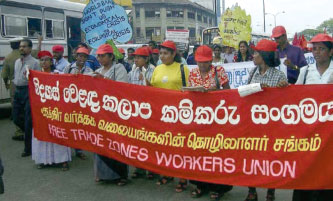Who
is involved in ExChains?
 ExChains
is a network of organisations from four different countries: Bangladesh,
Germany, Sri Lanka and Mexico and is coordinated by tie. ExChains
is a network of organisations from four different countries: Bangladesh,
Germany, Sri Lanka and Mexico and is coordinated by tie.
In Sri Lanka the FTZ&GSEU was established
in 2003, however its history goes back to 1982 when its forerunner
the Industrial, Transport and General Workers Union (ITGWU) was
established. The other organization, the Free Trade Zones Workers
Union, was formed as the first of its kind in the Sri Lankan Free
Trade Zones in January 2000. The FTZ&GSEU has 14,000 members
(25 percent are paying a membership fee) in 22 branches throughout
the country, including two branches in the East of Sri Lanka. 60
percent of the unions’ membership is women and women make
up 44 percent on the FTZ&GSEU Executive Committee. It is the
biggest trade union in the garment industry in Sri Lanka and also
the biggest trade union in the EPZ. The FTZ&GSEU has been affiliated
to the International Textile Garment and Leatherworkers Federation
(ITGLWF) since 2005.
Since 1985, the FTZ&GSEU (and its forerunner trade unions)
has had a close association with the Women’s Centre. The Women’s
Centre runs centre’s in the various FTZs providing support
and assistance to women workers to obtain dignity in their lives.
This includes listening to the problems women workers faced, organising
workshops to help them become conscious of the issues involved,
and ultimately fighting for their rights. The Centre’s provide
a physical space for women to meet, and provides daily papers, television,
videos, books and so on. It also involves a street drama group,
comprising FTZ employees. Workers act out dramas about factory work
and problems in boarding houses with the goal of raising awareness
amongst workers and the communities where the workers live and in
campaigning as a powerful tool to lobby and influence employers
and authorities.
In Bangladesh the National Garment Workers Federation
(NGWF) is partner. The NGWF was established in 1984. The NGWF was
formed during a period of martial law (which ended in 1986) and
it was not until 1995 that it was officially registered as a trade
union and 1996 as a federation. To date the NGWF has recruited 21,655
members, of which 5,200 are paying members (it costs 10 BDT to join
and membership dues are 10 BDT per month, but usually most members
pay 5 BDT per month). They have 30 plant-level registered unions.
The NGWF increases its number of plant-registered unions by approximately
4-5 each year. NGWF supports more than 1000 factory committees,
which are the first step to form the factory union. The vast majority
of members are women. The union, as required in its constitution,
has more than 50% women in all elected positions – on the
Executive (Central Committee) and at the branch/factory levels.
The NGWF has been affiliated to the International Textile Garment
and Leatherworkers Federation (ITGLWF) since 2005..
In Mexico ‘Servicio Desarollo y Paz’
(SEDEPAC) is involved in ExChains. SEDEPAC is a civil association
founded in 1983 and was formed to help unite the projects for rural
and community development that were emerging among social and popular
movements in Mexico as a response to the economic and social crisis
faced by that country. Due to the needs of the communities in Northern
Mexico, they have focused on the rights of maquiladora workers,
supporting for instance the struggle of Sara Lee garment workers
in Monclova and Frontera, Coahuila.
In Germany Ver.di, the union that organizes workers
in the services industry, is partner in ExChains. Ver.di was established
in 2001 and is with its 2.4 million members the biggest union in
the world. It is affiliated with the DGB, the Deutschen Gewerkschaftsbund.
Ver.di is active in 13 different branches of the service industry.
|
